ExAID Revolutionizes Skin Cancer Detection with AI-Assisted Diagnosis for Dermatologists
Early Detection Through AI: Revolutionizing Skin Cancer Diagnosis
Timely and precise identification of skin cancer, especially melanoma, plays a pivotal role in patient survival rates. While dermatologists traditionally rely on visual examination, this method suffers from subjectivity, time constraints, and specialist shortages globally. ExAID emerges as an innovative solution - an explainable AI diagnostic assistant that enhances dermatologists' capabilities while maintaining transparency in its decision-making process.
Key Points
- Malignant melanoma accounts for approximately 12% of skin cancer mortality in Germany.
- Early-stage detection dramatically improves treatment success rates.
- Traditional diagnostic approaches show limitations in consistency and accessibility.
- ExAID combines artificial intelligence with explainable results for clinical support.
- The system enhances diagnostic precision while optimizing medical workflows.
- Built-in transparency helps clinicians understand AI reasoning.
- Dual operation modes serve both medical practitioners and researchers.
- The technology aims to reduce melanoma mortality through earlier detection.
Understanding Skin Cancer and Diagnostic Challenges
Malignant Melanoma: A Deadly Skin Cancer
Originating from melanocytes, malignant melanoma represents one of the most aggressive forms of skin cancer with metastatic potential. While genetics and UV exposure contribute to its development, timely intervention remains the most critical factor affecting patient prognosis.
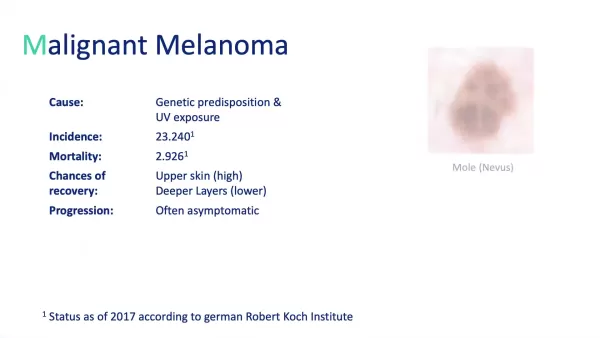
German healthcare statistics reveal concerning numbers - over 20,000 annual diagnoses with nearly 3,000 fatalities (Robert Koch Institute, 2017). These figures underscore the pressing need for advanced diagnostic solutions.
The Challenges of Visual Diagnosis
Distinguishing harmless moles from malignant lesions presents significant difficulties, even for experienced dermatologists. The subtle visual differences combined with melanoma's asymptomatic progression frequently result in delayed detection, highlighting the need for specialized training in recognizing malignant patterns.
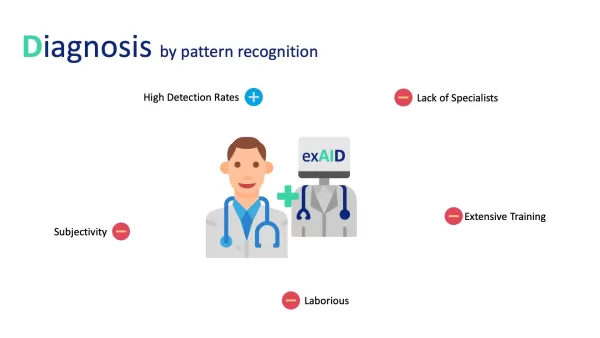
Introducing ExAID: Explainable AI for Skin Cancer Detection
ExAID: Augmenting Human Expertise with AI
This cutting-edge system serves as a clinical decision support tool, combining artificial intelligence with transparent reasoning mechanisms. Unlike conventional AI models that function as "black boxes," ExAID clearly explains the medical concepts influencing its assessments.
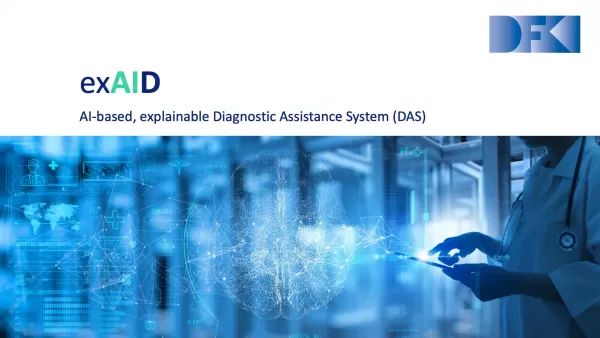
Two Modes of Operation: Diagnostic and Analytic
ExAID features distinct interfaces tailored for different professional needs:
- Diagnostic Mode provides real-time clinical decision support
- Analytic Mode facilitates research and model refinement
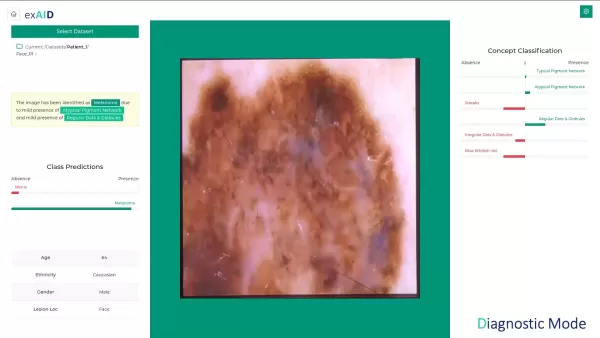
How ExAID enhances Medical Imaging
Understanding ExAID Interface
The clinician-focused interface presents comprehensive diagnostic information, including:
- Patient demographic data visualization
- Clear textual classifications
- Conceptual predictions
- Interactive heatmap adjustments
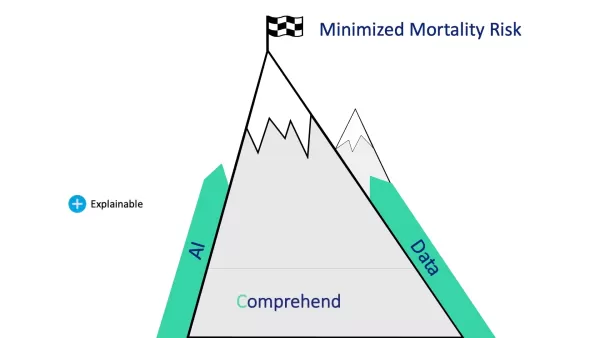
ExAID Pricing
ExAID pricing model
Currently in active development, ExAID hasn't released official pricing information. Commercial availability is expected following completion of research phases.
The Verdict on exAID: Strengths and Weaknesses
Pros
- Objective analysis capabilities
- Enhanced diagnostic precision
- Increased healthcare accessibility
Cons
- Limited adaptability
- Ongoing research status
- Currently works with restricted datasets
ExAID's Diagnostic Assistance
Key features of ExAID
The system distinguishes itself through:
- Transparent result explanations
- Concept-based analytical methods
- Comprehensive data examination tools
- Integration with deep learning classifiers
- Advanced data visualization capabilities
ExAID: Real-World Applications
Unveiling Uses for ExAID
This innovative technology demonstrates multiple clinical benefits:
- Enhanced diagnostic accuracy
- Clear concept translation for practitioners
- Versatile image processing capabilities
- Detailed performance metrics
- Support for various medical image formats
Frequently Asked Questions about ExAID
What is exAID?
ExAID represents an advanced diagnostic support system that combines AI-powered analysis with explainable results, specifically designed for skin cancer detection.
How does exAID improve upon current diagnostic methods?
The system addresses key limitations of traditional dermatology by:
- Reducing subjective interpretation
- Accelerating analysis timelines
- Providing transparent decision pathways
- Making specialist-level diagnosis more accessible
Who is the target audience for ExAID?
The platform serves two primary user groups:
- Clinical practitioners needing diagnostic support
- Medical researchers developing improved models
Further Insights into AI and Medical Imaging
How can AI transform healthcare in the future?
Artificial intelligence promises breakthroughs across multiple areas:
- Earlier and more accurate diagnoses
- Personalized treatment planning
- Optimized clinical workflows
- Advanced medical research capabilities
What are the ethical considerations of using AI in medical diagnosis?
Key concerns include:
- Patient data privacy protection
- Algorithm transparency requirements
- System reliability standards
- Clinical validation processes
Related article
 Akaluli AI Voice Recorder Enhances Productivity & Focus Efficiently
In our hyper-connected work environments, maintaining focus during crucial conversations has become increasingly challenging. The Akaluli AI Voice Recorder presents an innovative solution to this modern dilemma by seamlessly capturing, transcribing,
Akaluli AI Voice Recorder Enhances Productivity & Focus Efficiently
In our hyper-connected work environments, maintaining focus during crucial conversations has become increasingly challenging. The Akaluli AI Voice Recorder presents an innovative solution to this modern dilemma by seamlessly capturing, transcribing,
 Spotify increases Premium subscription costs in markets outside the US
Spotify is implementing subscription price hikes across multiple international markets just days after reporting underwhelming financial performance. The streaming giant confirmed Monday that Premium users throughout Europe, South Asia, the Middle Ea
Spotify increases Premium subscription costs in markets outside the US
Spotify is implementing subscription price hikes across multiple international markets just days after reporting underwhelming financial performance. The streaming giant confirmed Monday that Premium users throughout Europe, South Asia, the Middle Ea
 Cairn RPG: Easy-to-Learn Tabletop System for New Players
Want an exciting gateway into tabletop RPGs that won't overwhelm newcomers? Picture organizing an entire adventure with ten complete beginners in just fifteen minutes - starting from character creation to diving into gameplay with a fresh system. Sou
Comments (0)
0/200
Cairn RPG: Easy-to-Learn Tabletop System for New Players
Want an exciting gateway into tabletop RPGs that won't overwhelm newcomers? Picture organizing an entire adventure with ten complete beginners in just fifteen minutes - starting from character creation to diving into gameplay with a fresh system. Sou
Comments (0)
0/200
Early Detection Through AI: Revolutionizing Skin Cancer Diagnosis
Timely and precise identification of skin cancer, especially melanoma, plays a pivotal role in patient survival rates. While dermatologists traditionally rely on visual examination, this method suffers from subjectivity, time constraints, and specialist shortages globally. ExAID emerges as an innovative solution - an explainable AI diagnostic assistant that enhances dermatologists' capabilities while maintaining transparency in its decision-making process.
Key Points
- Malignant melanoma accounts for approximately 12% of skin cancer mortality in Germany.
- Early-stage detection dramatically improves treatment success rates.
- Traditional diagnostic approaches show limitations in consistency and accessibility.
- ExAID combines artificial intelligence with explainable results for clinical support.
- The system enhances diagnostic precision while optimizing medical workflows.
- Built-in transparency helps clinicians understand AI reasoning.
- Dual operation modes serve both medical practitioners and researchers.
- The technology aims to reduce melanoma mortality through earlier detection.
Understanding Skin Cancer and Diagnostic Challenges
Malignant Melanoma: A Deadly Skin Cancer
Originating from melanocytes, malignant melanoma represents one of the most aggressive forms of skin cancer with metastatic potential. While genetics and UV exposure contribute to its development, timely intervention remains the most critical factor affecting patient prognosis.

German healthcare statistics reveal concerning numbers - over 20,000 annual diagnoses with nearly 3,000 fatalities (Robert Koch Institute, 2017). These figures underscore the pressing need for advanced diagnostic solutions.
The Challenges of Visual Diagnosis
Distinguishing harmless moles from malignant lesions presents significant difficulties, even for experienced dermatologists. The subtle visual differences combined with melanoma's asymptomatic progression frequently result in delayed detection, highlighting the need for specialized training in recognizing malignant patterns.

Introducing ExAID: Explainable AI for Skin Cancer Detection
ExAID: Augmenting Human Expertise with AI
This cutting-edge system serves as a clinical decision support tool, combining artificial intelligence with transparent reasoning mechanisms. Unlike conventional AI models that function as "black boxes," ExAID clearly explains the medical concepts influencing its assessments.

Two Modes of Operation: Diagnostic and Analytic
ExAID features distinct interfaces tailored for different professional needs:
- Diagnostic Mode provides real-time clinical decision support
- Analytic Mode facilitates research and model refinement

How ExAID enhances Medical Imaging
Understanding ExAID Interface
The clinician-focused interface presents comprehensive diagnostic information, including:
- Patient demographic data visualization
- Clear textual classifications
- Conceptual predictions
- Interactive heatmap adjustments

ExAID Pricing
ExAID pricing model
Currently in active development, ExAID hasn't released official pricing information. Commercial availability is expected following completion of research phases.
The Verdict on exAID: Strengths and Weaknesses
Pros
- Objective analysis capabilities
- Enhanced diagnostic precision
- Increased healthcare accessibility
Cons
- Limited adaptability
- Ongoing research status
- Currently works with restricted datasets
ExAID's Diagnostic Assistance
Key features of ExAID
The system distinguishes itself through:
- Transparent result explanations
- Concept-based analytical methods
- Comprehensive data examination tools
- Integration with deep learning classifiers
- Advanced data visualization capabilities
ExAID: Real-World Applications
Unveiling Uses for ExAID
This innovative technology demonstrates multiple clinical benefits:
- Enhanced diagnostic accuracy
- Clear concept translation for practitioners
- Versatile image processing capabilities
- Detailed performance metrics
- Support for various medical image formats
Frequently Asked Questions about ExAID
What is exAID?
ExAID represents an advanced diagnostic support system that combines AI-powered analysis with explainable results, specifically designed for skin cancer detection.
How does exAID improve upon current diagnostic methods?
The system addresses key limitations of traditional dermatology by:
- Reducing subjective interpretation
- Accelerating analysis timelines
- Providing transparent decision pathways
- Making specialist-level diagnosis more accessible
Who is the target audience for ExAID?
The platform serves two primary user groups:
- Clinical practitioners needing diagnostic support
- Medical researchers developing improved models
Further Insights into AI and Medical Imaging
How can AI transform healthcare in the future?
Artificial intelligence promises breakthroughs across multiple areas:
- Earlier and more accurate diagnoses
- Personalized treatment planning
- Optimized clinical workflows
- Advanced medical research capabilities
What are the ethical considerations of using AI in medical diagnosis?
Key concerns include:
- Patient data privacy protection
- Algorithm transparency requirements
- System reliability standards
- Clinical validation processes
 Akaluli AI Voice Recorder Enhances Productivity & Focus Efficiently
In our hyper-connected work environments, maintaining focus during crucial conversations has become increasingly challenging. The Akaluli AI Voice Recorder presents an innovative solution to this modern dilemma by seamlessly capturing, transcribing,
Akaluli AI Voice Recorder Enhances Productivity & Focus Efficiently
In our hyper-connected work environments, maintaining focus during crucial conversations has become increasingly challenging. The Akaluli AI Voice Recorder presents an innovative solution to this modern dilemma by seamlessly capturing, transcribing,
 Spotify increases Premium subscription costs in markets outside the US
Spotify is implementing subscription price hikes across multiple international markets just days after reporting underwhelming financial performance. The streaming giant confirmed Monday that Premium users throughout Europe, South Asia, the Middle Ea
Spotify increases Premium subscription costs in markets outside the US
Spotify is implementing subscription price hikes across multiple international markets just days after reporting underwhelming financial performance. The streaming giant confirmed Monday that Premium users throughout Europe, South Asia, the Middle Ea
 Cairn RPG: Easy-to-Learn Tabletop System for New Players
Want an exciting gateway into tabletop RPGs that won't overwhelm newcomers? Picture organizing an entire adventure with ten complete beginners in just fifteen minutes - starting from character creation to diving into gameplay with a fresh system. Sou
Cairn RPG: Easy-to-Learn Tabletop System for New Players
Want an exciting gateway into tabletop RPGs that won't overwhelm newcomers? Picture organizing an entire adventure with ten complete beginners in just fifteen minutes - starting from character creation to diving into gameplay with a fresh system. Sou





























